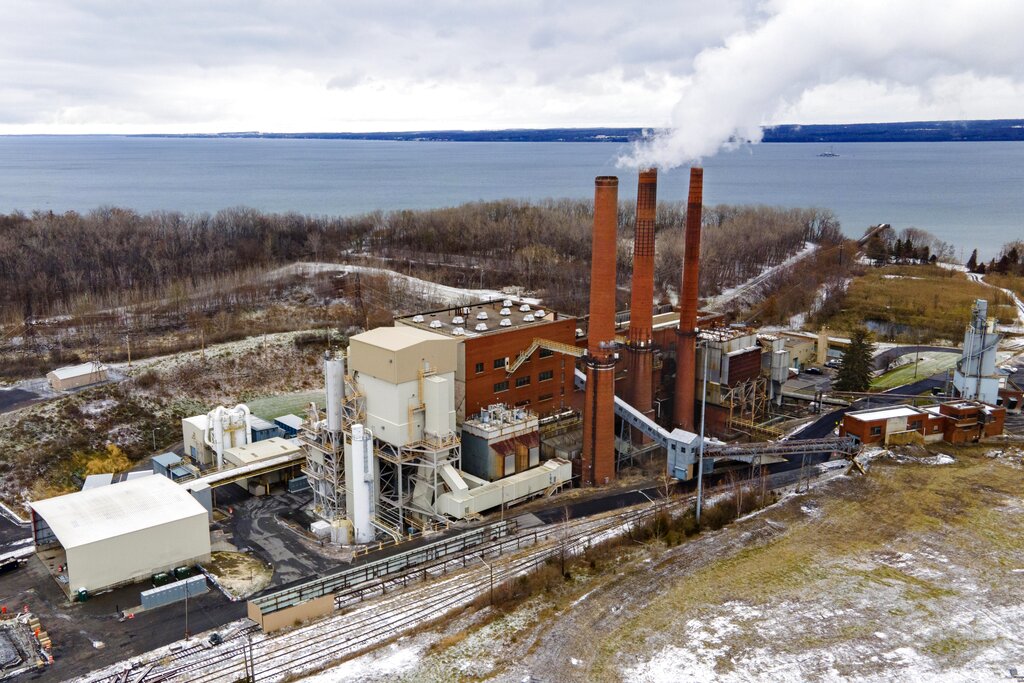On June 3, the New York Senate passed the U.S.’s first statewide moratorium on cryptocurrency mining, aimed at energy-intensive operations that use fossil fuels for power.
The measure, which still needs to be signed into law by Governor Kathy Hochul, comes as the crypto mining industry has opened an increasing number of operations in the U.S. The U.S. accounted for just over 4% of the world’s Bitcoin mining in 2019, but by January 2022, it was nearly 40%, according to the University of Cambridge. Some of these facilities are directly tied to power sources that emit significant amounts of carbon dioxide. Greenidge Generation in Dresden, N.Y., for example, repurposed a coal power plant that was previously shuttered. Other states with a crypto-mining boom include Georgia, Texas, Nebraska, Tennessee, and Oregon.
The two-year moratorium gives New York more time to study the impact of the operations, as Bitcoin mining requires large amounts of energy, and the crypto industry is experiencing a particularly tense reckoning over its environmental impact. In March, major national environmental groups launched Change the Code, Not the Climate, to push Bitcoin operations to give up on energy-intensive practices.
“With this bill’s passage, the legislature has rightly said fossil fuel power plants can’t get a second life in New York just for private industry gain, which would fly on the face of the state’s climate mandates,” said Liz Moran, New York Policy Advocate for Earthjustice, in a statement.
The moratorium’s focus is relatively narrow—it won’t impact existing operations, and it’s focused only on those that generate their own power instead of drawing from the state’s supply. Still, environmental advocates and industry groups say it could provide a blueprint for other states, and if implemented widely, could make a real difference.
The New York legislation was inspired in part by controversy over Greenidge Generation, which restarted an old power plant in Dresden,and turned it into a natural-gas-fueled data center with thousands of computers for Bitcoin mining.
Yvonne Taylor, vice-president of the non-profit Seneca Lake Guardian, told TIME in March that the plant was a “a test case for how other underutilized or decommissioned power plants across the state are going to fall, and frankly, beyond.”
Similar crypto mining operations are dotted across the U.S. in disparate locales and running on different fuel sources, and those who live near these facilities share similar complaints: loud buzzing noise, more strain on the power grid, and concerns about undermining efforts to stem climate change.
Read More: The Bitcoin Mining Showdown In New York’s Wine Country
The New York moratorium, although backed by advocates opposing the Dresden plant, will not actually affect Greenidge—it only pauses any new upstarts. Greenidge could still face a state crackdown, though. It’s awaiting an air permitting decision from Governor Hochul and the state’s Department of Environmental Conservation. That decision is expected to come at the end of June, after the state’s primary election.
Lawmakers also stress this bill’s narrow purview. It is not, for example, aimed at small-scale boutique mining operations or those that use renewable energy, says assemblymember Anna Kelles, who introduced the bill.
“This bill is a power plant bill,” Kelles said on a press call the afternoon after the bill’s passage.
Kelles also predicted that the state could still be a cryptocurrency hub, as long as companies use renewable energy sources and are mindful of environmental impacts.
Advocates for the bill have now turned their attention to Governor Hochul, who still needs to sign it. On the June 3 press call, advocates celebrated what they said was a last-ditch effort to bring the bill to the floor. They’re also calling on the governor to take even more sweeping action by declaring a moratorium on all crypto mining via executive action, which she would have the authority to do.
New York’s crypto mining landscape has become increasingly political in recent months. Hochul’s campaign received $40,000 from Ashton Soniat, the chairman & CEO of Coinmint, according to the New York Times. Coinmint operates what it calls “one of the largest digital currency data centers in the world” in a former aluminum smelting plant near Massena, N.Y. That plant would not be affected by the moratorium’s narrow restrictions, although it’s been enmeshed in its own local controversy and crackdowns. Lobbyists from entities such as the conservative Club for Growth have also increased pressure on lawmakers in recent months to vote against the moratorium. Advocates worry that lobbying places pressure on the governor to slow-walk regulations.
“We certainly hope that the governor will stand with the people of New York and not lobbyists who are dangling dollar bills in front of her,” Taylor told TIME.
Amid the political pressures, Kelles highlighted the environmental study that would be also triggered by the bill. “This is about stepping away from any sort of emotional reaction, stepping away from the politics, stepping away from the big money lobbyists, and getting the actual data,” she said.
Contact us at letters@time.com.
Author
Administraroot

